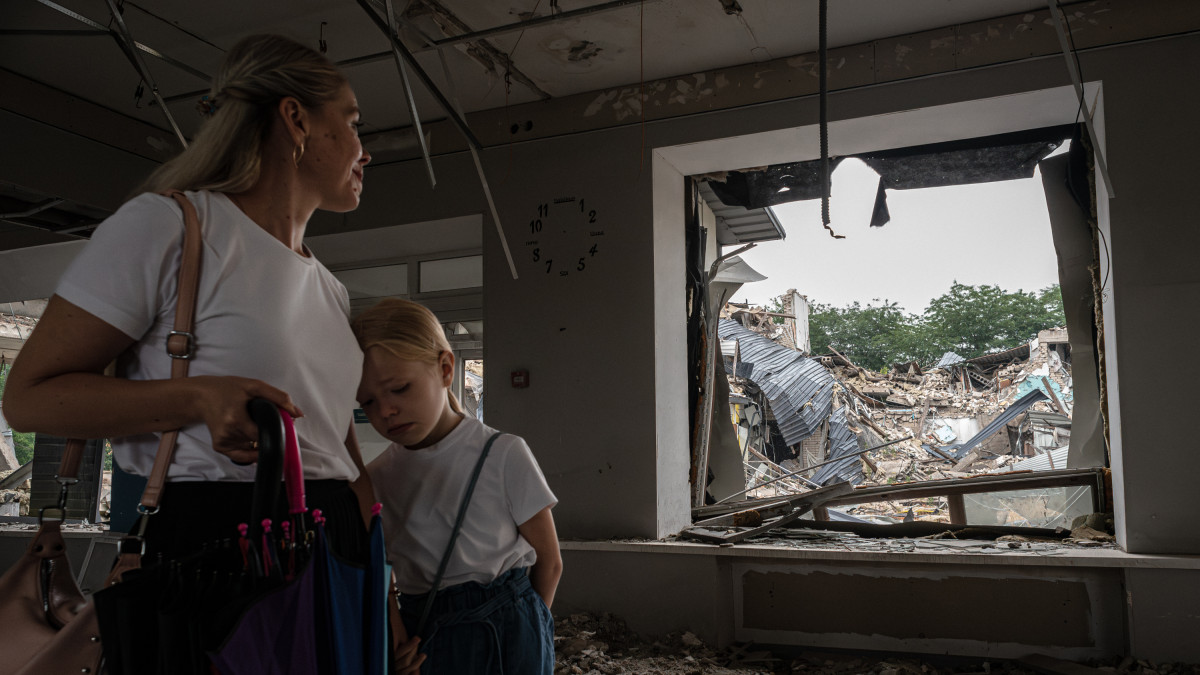Education under fire: helping Ukrainian children in learn during wartime
Published: Jun 27, 2025 Reading time: 5 minutes Share: Share an articleIn 2024, nearly 3 million children in Ukraine required humanitarian aid, with over a million of them needing educational support. Russia’s war on the country has destroyed or damaged thousands of schools, forced families to flee their homes, and forced children to study in bomb shelters or online. Constant air raid sirens, the lack of safe spaces, loss of motivation, and incessant stress have become everyday challenges for Ukrainian students and teachers.
We are helping children return to in-person learning—whether in repaired schools, temporary learning spaces, or through access to distance education. Our goal is to make education accessible, safe, and high-quality for all children, especially those living near the frontlines.

Nearly 4,000 schools in Ukraine have been damaged by shelling and bombing, with 365 completely destroyed. A safe and accessible learning environment is fundamental for children’s well-being and their ability to learn effectively. We repair schools and create temporary learning spaces in shelters. This helps children learn without fear and focus on their studies instead of danger.
At Gymnasium No. 42 in Kryvyi Rih, an explosion destroyed part of the roof and shattered almost all windows. For children to return to in-person classes, the school needed a safe and comfortable shelter. What was once a flooded basement was transformed into bright, warm classrooms with modern furniture, ventilation, lighting, bathrooms, and a space for individual lessons. Thanks to the renovation, 500 children were able to return to school.
“This wasn’t just a cosmetic repair – it was a full reconstruction. Our building is nearly 70 years old, and we had to strip everything down to the brick. But that allowed us to bring even more children back to learning,” says school principal Alyona Kornieva.
In areas where in-person learning is prohibited due to security concerns, we establish Digital Learning Centres. These allow children to use computers, join online lessons, receive support from facilitators, and take part in various activities—from workshops to sports games.
“The goal of the centre is to give children who lack computers or internet at home access to education. They can come here in the morning for classes and spend the afternoon being creative. Our facilitators offer activities for additional development: workshops, computer literacy lessons, sessions with psychologists or speech therapists, and creative evenings,” explains Iryna Kolupaieva, an Education Coordinator at People in Need.
One of these centres in Kharkiv Oblast is attended by 9-year-old Sofiia. Like thousands of other Ukrainian children, she has to learn online, thus she is denied normal, socially-important interactions with her classmates.
“It’s extremely important, especially for families with many children who can’t afford a device for each one. And it’s vital for families where all adults work, with no one to stay home with the child,” adds Sofiia’s mother, Liudmyla.
The COVID-19 pandemic and Russia’s full-scale war in Ukraine have led to significant educational losses. With the shift to online learning, frequent air raids, and unstable internet access, many students have missed out on consistent education. Younger students and children from rural communities—where access to technology and transport is limited—have been most affected.
To help students catch up on missed material, we launched a Catch-Up Programme. It identifies gaps in knowledge and offers targeted support. Teachers receive special training to adapt their lessons and identify students who need extra help. Children study in small groups and receive more attention and guidance from tutors. These sessions help learners regain their knowledge and return to stable learning.
“Our Ukrainian language is beautiful. I want to master it. I’m happy to have the chance to attend extra Ukrainian language lessons. They’re engaging—we play games and it never feels like a regular lesson. I can feel my knowledge improving,” says Diana, who attends tutoring sessions in Ukrainian.
In the context of full-scale war, education in Ukraine goes far beyond repairing schools or supplying books. Our education support is comprehensive and aimed at strengthening emotional resilience and overall well-being.
Our mobile teams of psychologists and social workers help children cope with stress, conduct speech therapy sessions, and work in groups or one-on-one. We train teachers to avoid burnout and provide psychological first aid to themselves and their students. Social-emotional learning helps children build emotional intelligence and connection, and we encourage teachers to integrate these practices into their daily lessons. In our child-friendly spaces, kids can not only learn, but also play, socialise, and recover in a safe environment under professional supervision.
To strengthen school safety, accessibility, and inclusion, we establish School Improvement Committees composed of children, teachers, and caregivers. These committees assess needs, identify priorities, and develop action plans to improve their school environment. The goal is not just general improvement, but to empower school communities to lead change by designing and driving the improvements themselves.
“Schools are not just buildings—they are living communities. By involving children, teachers, and caregivers in jointly shaping their school environment, we create spaces that reflect their needs and support their learning and well-being. It’s about giving communities a say in how education is rebuilt and reimagined – encouraging them to become active agents of change in their environment. It’s also about helping adults see children as equal partners in conversations about their community”, says Agata Kolodziej, Education Technical Lead at People in Need.
Our education strategy unites efforts across sectors to ensure safe, quality, barrier-free education and create conditions where every child has the chance to learn, grow, and shape their future—despite the war.



